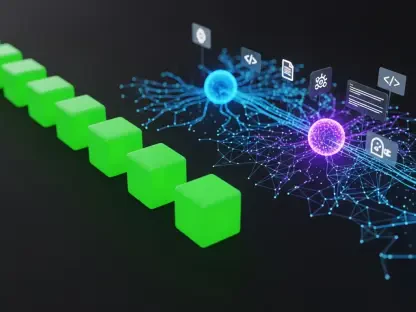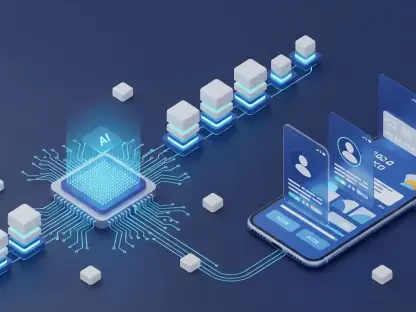In recent years, the technological landscape has witnessed a dramatic shift with the integration of AI in DevOps, creating a new frontier in software development and deployment. Organizations face a mounting challenge in managing rapid software releases and updates. The fusion of artificial intelligence with DevOps processes presents a promising solution, aiming to streamline operations and reduce engineers’ workload. This development has sparked widespread interest, promising to democratize DevOps advantages across varied industries that have historically struggled with acquiring such expertise.
Core Evolution of AI-Powered DevOps
AI-powered DevOps pipelines have fundamentally redefined the way development and operations converge. These pipelines rest on core principles that include automation, real-time analysis, and learning algorithms. This evolution is underscored by advancements such as natural language processing and machine learning, which have contributed to creating sophisticated systems that understand and execute complex tasks with minimal human intervention. They have emerged from the necessity for enhanced efficiency and accuracy, providing an invaluable asset in today’s fast-paced technological environment.
Incorporating AI into DevOps highlights its significant relevance within the broader technological ecosystem. AI-driven pipelines empower organizations to optimize their workflow by employing intelligent systems that analyze data and adapt processes accordingly. This synergy not only accelerates development cycles but also minimizes errors, thereby promoting a culture of continuous integration and delivery. The rise of AI in DevOps is setting a platform for unprecedented growth and innovation across various sectors.
Distinct Features and Components of AI-Driven Pipelines
Natural Language Pipeline Generation
One of the standout features of AI-powered DevOps pipelines is the ability to generate pipelines using natural language. Leveraging large language models, this functionality allows developers to articulate processes in plain language, which the system translates into executable code, adhering to corporate standards. Harness employs cutting-edge models like Anthropic Claude 3.7 Sonnet and OpenAI GPT-4.0 to adapt dynamically to tasks, streamlining development operations by reducing the need for extensive manual coding.
The performance of this feature has been marked by increased efficiency and ease of use, significantly lowering the entry barrier for organizations adopting DevOps practices. This capability underscores the broader impact of AI, facilitating a deeper integration of intelligent systems within traditional frameworks and empowering teams to focus on strategic developments rather than routine coding tasks.
Intelligent Error Analysis and Fix Recommendations
AI-powered error analysis and fix recommendations constitute another critical component of modern DevOps pipelines. This feature utilizes AI algorithms to scrutinize pipeline logs, identify error patterns, and suggest automatic corrections. Harness’s capability in correlating errors and recommending fixes highlights a shift in focus from reactive troubleshooting to proactive error management, ensuring smoother and more reliable deployments.
This capability allows for increased operational resiliency, where errors can be swiftly addressed, minimizing downtime and enhancing overall system performance. Its real-world significance is evident in various deployments, showcasing its effectiveness in improving system reliability and reducing the frequency of manual intervention in error handling.
Recent Trends and Industry Movements
The latest developments in AI-powered DevOps pipelines are indicative of a shift in industry practices. With a growing reliance on AI for code generation and error management, organizations are progressively embracing these tools to stay competitive. This trend is led by increasing demands for rapid innovation and the need to maintain a high velocity in software delivery.
Emerging trends also indicate an inclination toward utilizing AI in enhancing security protocols within DevOps workflows. The integration of technology such as the Rego programming language for policy enforcement as code exemplifies these efforts. The industry’s momentum is moving towards creating more secure, efficient pipelines that are tailored to the evolving demands of a digitalized world.
Real-World Implementations and Applications
AI-powered DevOps pipelines have found practical applications across various industries. Sectors such as finance, healthcare, and e-commerce are leveraging these pipelines for their immense potential in expediting development and robustly managing operational challenges. These pipelines facilitate not only faster deployment but also reinforce security and compliance, which are crucial factors in industry-specific applications.
Notable implementations include advanced automated testing environments in software companies and dynamic delivery systems in high-frequency trading platforms. Each instance underscores the transformative impact of AI-driven DevOps, illustrating its potential to revolutionize traditional practices through innovation and automation.
Challenges Facing AI in DevOps
Despite its promising advancements, AI-powered DevOps faces several challenges that may affect its widespread adoption. Technical complexities related to model training and deployment, along with regulatory and data privacy concerns, pose significant hurdles. Moreover, there are market barriers stemming from the high initial costs of implementation and the need for continuous updates and maintenance.
Efforts to overcome these limitations are ongoing, with strategic collaborations and technological advancements aimed at refining AI models and reducing operational expenses. Addressing these challenges is critical to unlocking the full potential of AI in DevOps, ensuring that organizations can maximize its benefits while mitigating associated risks.
Future Developments and Outlook
Looking ahead, AI in DevOps is poised for even greater transformation and innovation. Future developments are likely to focus on enhancing model precision, improving integration with other emerging technologies, and extending its functional capabilities. These advances promise to drive unprecedented growth in software delivery, democratizing access to state-of-the-art DevOps practices.
Prospects for AI-powered DevOps pipelines suggest a trajectory towards enhanced automation and intelligence, enabling organizations to scale their operations efficiently. Long-term, these systems may redefine industry standards, shaping the future of software development and delivery across global markets.
Final Assessment
In summary, AI-powered DevOps pipelines represent a revolutionary shift in the way software development processes are managed and executed. This technology has matured remarkably, with significant strides made in natural language processing, error management, and intelligent automation. While challenges remain, ongoing advancements indicate a promising future where AI will play a pivotal role in transforming industries. As organizations navigate this evolving landscape, embracing AI-powered solutions will be crucial to staying competitive and harnessing the full potential of modern DevOps.









